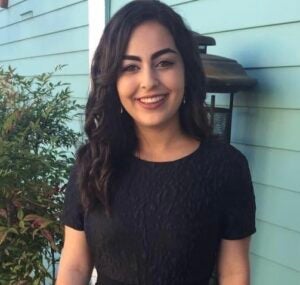Melody Malek
 Education:
Education:
B.S. Biological Sciences, University of California, Irvine, 2019
From: Milpitas, California
Joined David Lab: January 2021
Outside of lab: I enjoy reading, watching tv, and cooking
Research in David Lab:
DNA is prone to oxidative damage by both exogenous and endogenous sources. DNA damage must be repaired to maintain genomic integrity, and the base excision repair (BER) pathway has evolved to recognize and initiate repair caused by oxidative damage. My projects involve the glycosylases hOGG1 and NEIL 1, 2, and 3. My work with hOGG1 involves synthetic organic chemistry to synthesize potent and specific nucleic acid based inhibitors of the enzyme. It has been previously demonstrated by our lab that certain transition state analogue mimics tightly bind hOGG1’s active site, but it has yet to be demonstrated that these analogues can inhibit the enzyme in a cellular context, which is what my work focuses on. My second project (involving NEILs 1, 2, and 3) involves understanding whether repair of oxidative damage by the NEILs is affected by oxidants such as hydrogen peroxide and potassium bromate in a cellular context.
Previous Research Experience:
As an undergrad, I worked in Dr. James Nowick’s lab for 2.5 years. My first project involved synthesizing fluorescent mimics of the amyloid beta peptide, the aggregation of which has been linked to the incidence of Alzheimer’s disease. My second project involved synthesizing fluorescent mimics of the peptidic antibiotic teixobactin, which shows no detectable resistance. This work led to a publication that details the mechanism by which teixobactin is able to localize to the lipid bilayer of gram-positive bacteria.
